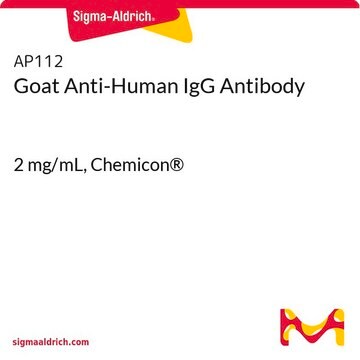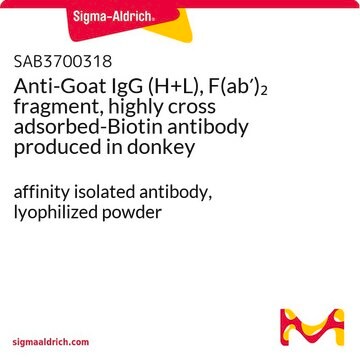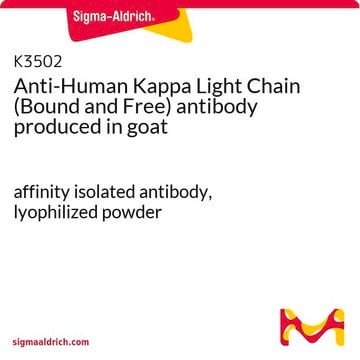AP112B
Goat Anti-Human IgG Antibody, biotin conjugate
Chemicon®, from goat
About This Item
Empfohlene Produkte
Biologische Quelle
goat
Qualitätsniveau
Konjugat
biotin conjugate
Antikörperform
affinity purified immunoglobulin
Antikörper-Produkttyp
secondary antibodies
Klon
polyclonal
Speziesreaktivität
human
Hersteller/Markenname
Chemicon®
Methode(n)
ELISA: suitable
western blot: suitable
Versandbedingung
wet ice
Posttranslationale Modifikation Target
unmodified
Allgemeine Beschreibung
Spezifität
Immunogen
Anwendung
Sekundär- & Kontrollantikörper
Sekundärantikörper gegen Gesamtimmunglobulin
Western blots: 1:20,000-1:400,000 using enzyme-streptavidin conjugate.
Immunohistochemistry: 1:500-1:5,000 using enzyme-streptavidin conjugate.
Flow cytometry: 1:200-1:1,000.
Fluorescence Immunohisto/cytochemistry: 1:200-1:1,1000.
Optimal working dilutions must be determined by the end user.
Physikalische Form
Lagerung und Haltbarkeit
Rechtliche Hinweise
Haftungsausschluss
Sie haben nicht das passende Produkt gefunden?
Probieren Sie unser Produkt-Auswahlhilfe. aus.
Signalwort
Warning
H-Sätze
Gefahreneinstufungen
Acute Tox. 4 Dermal - Acute Tox. 4 Inhalation - Aquatic Chronic 3
Lagerklassenschlüssel
11 - Combustible Solids
WGK
WGK 3
Analysenzertifikate (COA)
Suchen Sie nach Analysenzertifikate (COA), indem Sie die Lot-/Chargennummer des Produkts eingeben. Lot- und Chargennummern sind auf dem Produktetikett hinter den Wörtern ‘Lot’ oder ‘Batch’ (Lot oder Charge) zu finden.
Besitzen Sie dieses Produkt bereits?
In der Dokumentenbibliothek finden Sie die Dokumentation zu den Produkten, die Sie kürzlich erworben haben.
Unser Team von Wissenschaftlern verfügt über Erfahrung in allen Forschungsbereichen einschließlich Life Science, Materialwissenschaften, chemischer Synthese, Chromatographie, Analytik und vielen mehr..
Setzen Sie sich mit dem technischen Dienst in Verbindung.









